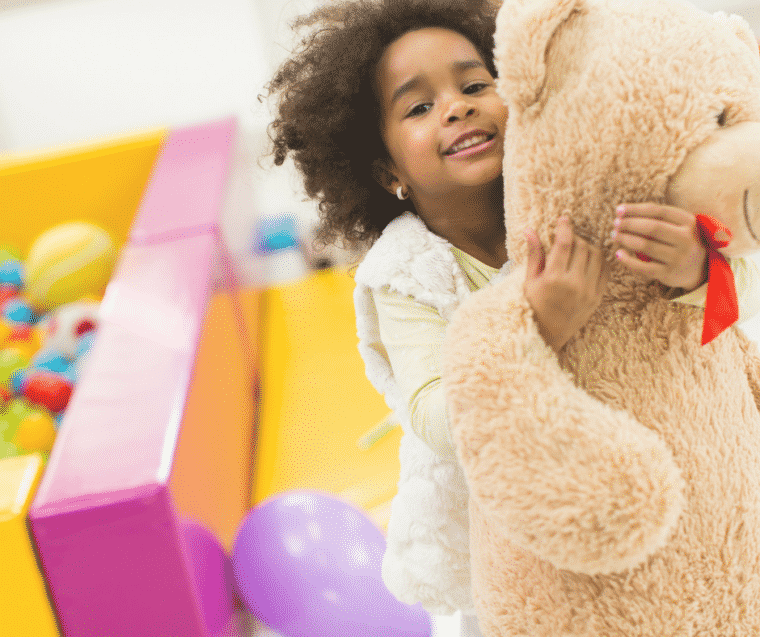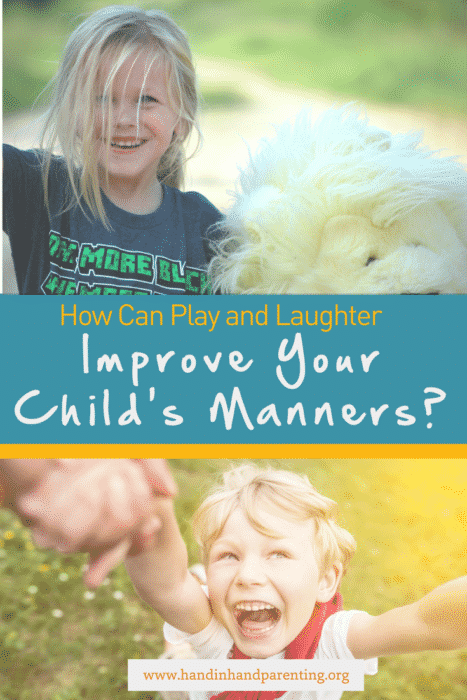![]() A Guest Post by Michelle Hartop
A Guest Post by Michelle Hartop
My daughter’s manners got lost somewhere between 5 and 6 years old.
Once the reigning “thank-you queen,” by school-age, she seemed bothered even receiving a gift, let alone actually thanking the giver, and my approach to use logic and discuss the importance of saying thank you and showing gratitude were not well received.
 A fellow Hand in Hand Instructor shared something she learned from Larry Cohen, author of the book Playful Parenting. The basic idea is that, while playing with your child, you keep a teddy bear (or other stuffed animal/puppet) close by. While you’re playing, let the stuffed animal act out or say the things you don't want your child to do or say.
A fellow Hand in Hand Instructor shared something she learned from Larry Cohen, author of the book Playful Parenting. The basic idea is that, while playing with your child, you keep a teddy bear (or other stuffed animal/puppet) close by. While you’re playing, let the stuffed animal act out or say the things you don't want your child to do or say.
Bear Plays Ball: How Bringing Laughter To The Situation Helps my Daughter's Manners
I thought I'd try it with my daughter and remembering basic manners.
The next morning my daughter was fussing about a gift she knew was coming. She was saying, “I’ll just give away whatever gift she gives to me!”
I got our teddy bear out and sat down beside her. I paused quietly then looked at the teddy next to me and said in a shocked voice, “No teddy! You CANNOT say that!”
This got my daughter’s attention. “What! What did he say?” she asked.
I picked up Teddy and animated him as “he” spoke. “Yuck, I hate this!” I made him say.
She giggled.
“Teddy, no!” I said. “Don’t say it that way!” I put my hand over Teddy’s mouth, then after a moment, I said again, “No teddy! You cannot say that either!”
“What’d he say?” my daughter asked.
“This is stupid poo-poo!” Teddy said.
Stepping In: My Daughter Takes Control – And Improves Her Tone
 My daughter found this hilarious and I knew I was on the right track. (For more on how laughter helps children's difficult behaviors, read Mommy Is A Silly Creature: How Laughing With Your Child Helps Power Struggles)
My daughter found this hilarious and I knew I was on the right track. (For more on how laughter helps children's difficult behaviors, read Mommy Is A Silly Creature: How Laughing With Your Child Helps Power Struggles)
After a few more rounds SHE started instructing Teddy in the ways of manners. She offered him a sticker, as a gift, and told him about asking with a please and saying thank you.
When I had Teddy respond poorly, “I hate stickers! I don’t want any!” She was calm and patient saying, “That’s okay Teddy. Maybe you’d like to see some different ones?”
I was amazed at her ability to shift into this new space.
We played this way for about 5 minutes, gently guiding Teddy toward more polite behavior. And when we were done she gave Teddy a “thank-you” hug.
She asked to play this way a couple more times. Teddy was always as rude as he could be and she was always patient, calm, and gently guiding him to kinder words. This non-direct approach about manners kept the focus from being on her, and feeling that she was doing it “wrong”.
In play, she got to be the teacher and show me she knew exactly how to use her manners. And, I’m happy to say, her own manners did soon return!
Try a Little Role Reversal To Transform Parenting Challenges
This kind of play helps children face the anxieties that can cause their sticky behavior in a light, playful way. In it, you set up situations affecting your little one and re-work them towards more positive outcomes. You might take on your child’s role, or you might assign that to their toys, and you might often see your child take on the adult role. This helps them re-work the situation from a number of angles.
For more playful responses read 15 Games For Every Parenting Challenge
Don't feel playful? Try the ideas in What If I'm Just Not A Playful Parent?
Join the next Hand in Hand Parenting Starter Class for your complete 6-week introduction to the Hand in Hand Parenting approach. Learn how to deepen the connection you have with your children, and parent with confidence through your biggest challenges.
